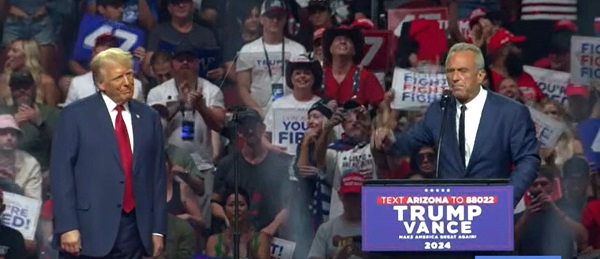From The Center Square
“As I was saying”
Eighty-four days later, former President Donald Trump returned on Saturday to the scene of an assassination attempt on his life in western Pennsylvania.
“As I was saying,” Trump said, the crowd responding in a roar as he turned toward a graph on a projector screen behind him. “I love that chart. I love that graph. Isn’t it a beautiful thing?”
The former president picked up right where he left off July 13, when bullets tore through the crowd killing one man and wounding two others.
The graph showed the amount of illegal border crossings recorded on Trump’s last day in office in 2021. It’s also the one he was looking at when a bullet from 20-year-old Thomas Crooks’s rifle grazed his right ear.
Moments later, U.S. Secret Service agents tackled Trump as a sniper shot and killed Crooks on the roof of the AGR building roughly 400 feet from the rally stage.
In his return, Trump thanked them as well as the local law enforcement and emergency responders who leaped into action in the aftermath of the shooting.
“They were on top of me so fast,” he said of the Secret Service agents. “They were on top of me and there was not even a moment of doubt in their minds.”
The comments contrast the intense scrutiny lobbed onto the agency in recent months as the cascading series of communication and security failures at the rally came to light. A second attempt on the former president’s life while he golfed in West Palm Beach, Fla., on Sept. 15 drew further ire.
On Saturday, however, those concerns weren’t on Trump’s mind. Instead, he took aim at Vice President Kamala Harris and “the very corrupt political establishment,” who he says villainize him, and the “everyday people” who “are the heart and soul of this country.”
“So, what our opponents have never understood is this movement has never been about me; it’s been about you,” he said to the crowd before referencing the “millions and millions” of supporters across the country. “Your hopes are my hopes. Your dreams are my dreams and your future is what I’m fighting for every single day.”
The long-anticipated event commenced exactly one month before Election Day and featured appearances by Ohio U.S. Sen. J.D. Vance, Donald Trump Jr. and his wife Lara, and Elon Musk. Vance is the vice president nominee on the ticket; Lara Trump is co-chairman of the Republican National Committee.
Moments throughout turned poignant as Trump ordered a moment of silence for 50-year-old Corey Comperatore, the former fire chief who died shielding his family from gunfire on July 13. The reflection was capped by an operatic performance of Ave Maria by Christopher Macchio.
“Some people don’t just die in vain, and what he’s left behind is incredible,” Trump said. “God bless you, Corey. God bless you.”
At times, the former president lambasted the Biden administration for its border policy, investments in foreign conflicts, and social politics. At others, he thanked the crowd for their support even after his critics carried out multiple impeachments, indictments and ballot challenges.
“And who knows, maybe even tried to kill me,” he said, referencing fringe conspiracies about Crooks’ motive. “And in turn, you have always stood with me, no matter what. We are a great team.”

Lara Trump, co-chairman of the Republican National Committee and daughter-in-law of former President Donald Trump, said, ‘We need strength at 1600 Pennsylvania Ave.’ She was speaking at a campaign rally in Butler, Pa., on Saturday, Oct. 5, 2024.







 United States — Approx. 30–32 vaccine doses (counts combination products as single dose) before age 18
United States — Approx. 30–32 vaccine doses (counts combination products as single dose) before age 18 Canada — ≈ 25–28 doses
Canada — ≈ 25–28 doses France /
France /  Germany — ≈ 22–25 doses
Germany — ≈ 22–25 doses United Kingdom — ≈ 20–21 doses
United Kingdom — ≈ 20–21 doses Australia — ≈ 20 doses
Australia — ≈ 20 doses Sweden /
Sweden /  Norway — ≈ 16–18 doses
Norway — ≈ 16–18 doses Japan — ≈ 14–16 doses
Japan — ≈ 14–16 doses Summary — Total Vaccine Doses (Ages 0–18 Years)
Summary — Total Vaccine Doses (Ages 0–18 Years) Interpretation
Interpretation
















